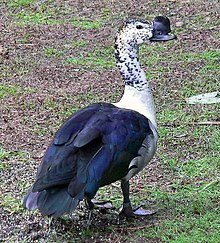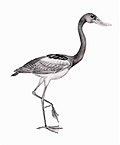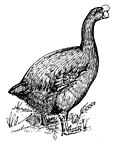Sarkidiornis
This article relies largely or entirely on a single source. (May 2024) |
| Sarkidiornis | |
|---|---|

| |
| Comb duck (Sarkidiornis sylvicola) | |
| Scientific classification | |
| Domain: | Eukaryota |
| Kingdom: | Animalia |
| Phylum: | Chordata |
| Class: | Aves |
| Order: | Anseriformes |
| Family: | Anatidae |
| Subfamily: | Tadorninae |
| Genus: | Sarkidiornis Eyton, 1838 |
Sarkidiornis is a genus within the family Anatidae comprising two species that inhabit aquatic environments in tropical and subtropical regions of South America, Africa and southern Asia.. Sarkidiornis is sometimes considered a monotypic genus with its sole member the knob-billed duck (S. melanotos), a cosmopolitan species.
Taxonomy
[edit]This genus was first described in 1838 by Thomas Campbell Eyton.[1] The type species, Anser melanotos (S. melanotos), was originally described in 1769 by Thomas Pennant, based on a bird collected in what is now Sri Lanka.[2]
Etymologically, the term Sarkidiornis is derived from Greek, where sarkidion means "little meat" or "caruncle", and ornis means "bird". This name refers to the fleshy crest at the base of the male’s beak.
Most taxonomic authorities[who?], however, split the species into two:
| Common name | Scientific name and subspecies | Range | Size and ecology | IUCN status and estimated population |
|---|---|---|---|---|
| Knob-billed duck | Sarkidiornis melanotos (Pennant, 1769) |
Sub-Saharan Africa, Madagascar and Southern Asia from Pakistan to Laos and extreme southern China
|
Size: Habitat: Diet: |
LC
|
| Comb duck | Sarkidiornis sylvicola (Ihering, HFA & Ihering, R, 1907) |
eastern Paraguay, southeastern Brazil and extreme northeastern Argentina
|
Size: Habitat: Diet: |
LC
|
References
[edit]- ^ Eyton, T. C.; Hullmandel, Charles Joseph; Lear, Edward; Scharf, George (1838). A monograph on the anatidae, or duck tribe /. London: Longman, Orme, Brown, Green, & Longman ... and Eddowes, Shrewsbury. doi:10.5962/bhl.title.51971.
- ^ Pennant, Thomas; Mazell, Peter (1769). Indian zoology /. [London]: [publisher not identified]. p. 11-12. doi:10.5962/bhl.title.153157.
- https://www.itis.gov/servlet/SingleRpt/SingleRpt?search_topic=TSN&search_value=175243#null ITIS reference






